Wednesday, August 02, 2006
Big Shoulders, Part II
 I decide the thing to do is to drive to the north side and then take a train to the Loop, thus to enable: (1) biking or rollerblading in Lincoln Park, and (2) easier location of internet-enabled coffee hangs. So I scoot up Lake Shore Drive, past still-undercrowded beaches, and find a spot a couple of blocks from Wrigley Field, and after wandering a bit and dredging up a few more forgotten days, I hop the L train at Belmont that takes the scenic route.
I decide the thing to do is to drive to the north side and then take a train to the Loop, thus to enable: (1) biking or rollerblading in Lincoln Park, and (2) easier location of internet-enabled coffee hangs. So I scoot up Lake Shore Drive, past still-undercrowded beaches, and find a spot a couple of blocks from Wrigley Field, and after wandering a bit and dredging up a few more forgotten days, I hop the L train at Belmont that takes the scenic route.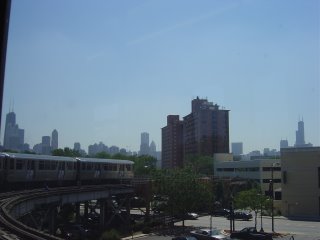
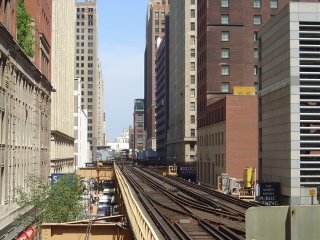
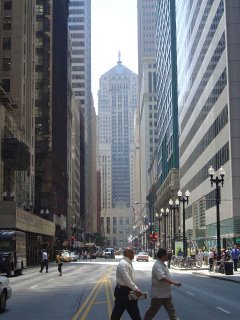 The train takes me right to LaSalle Street, Chicago's great canyon with the Board of Trade at the foot, and the Rookery building a block or two up the street. It also puts me near the old First Chicago headquarters building, with its massive sloping sides that architects have been poorly ripping off ever since. It used to house the largest bank branch in the world, with a line of teller windows from one end of the block to the other, but the Chase Manhattan JP Morgan Bank One USA company, or whatever they're called now, decided fabric-walled cubicles would improve the space. (No picture. For some reason, I'm of the opinion that CMJPMB1USA's security guards might not approve.)
The train takes me right to LaSalle Street, Chicago's great canyon with the Board of Trade at the foot, and the Rookery building a block or two up the street. It also puts me near the old First Chicago headquarters building, with its massive sloping sides that architects have been poorly ripping off ever since. It used to house the largest bank branch in the world, with a line of teller windows from one end of the block to the other, but the Chase Manhattan JP Morgan Bank One USA company, or whatever they're called now, decided fabric-walled cubicles would improve the space. (No picture. For some reason, I'm of the opinion that CMJPMB1USA's security guards might not approve.)I'm around the corner from the Sears Tower, and suddenly I recall my old colleague Rosalind's phone number. So what the hell. I call her up, and she's actually there not in a meeting, and spares an hour or so to invite me up to Citigroup's offices on the 86th floor.
 It's great to see her, and laugh about old times including the horrific oil company customer who complained that our 100-page proposal wasn't long enough. And she graciously gives me the overhead view of Chicago.
It's great to see her, and laugh about old times including the horrific oil company customer who complained that our 100-page proposal wasn't long enough. And she graciously gives me the overhead view of Chicago. The Sears Tower is mighty tall. You can tell that from the street, of course. But what takes my breath away is looking down at the puny buildings underneath us, the ones that are only 60 or 70 stories tall. And then considering that there are still about 25 floors above us.
The Sears Tower is mighty tall. You can tell that from the street, of course. But what takes my breath away is looking down at the puny buildings underneath us, the ones that are only 60 or 70 stories tall. And then considering that there are still about 25 floors above us.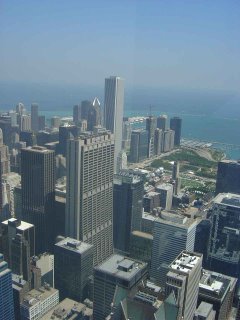
Afterward, I head in the direction of Millennium Park, at Rosalind's suggestion. On the way, I pass the Berghoff, which was my second-favorite restaurant in Chicago. My Aunt Barb had brought me here for the first time when I was a kid, and the place had been totally unchanged not just since then but since it opened in 1899 (although they were, at some point, required to start hiring women to wait tables). So I'd been dismayed to learn, late last year, that it was going to close after 107 years.
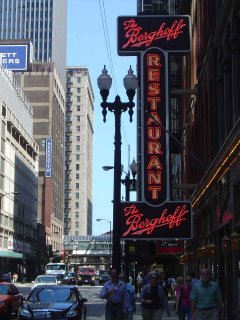 It turns out that it might as well have done so. The dining room upstairs has been turned into a catering hall, and there's a dismal little cafeteria in the basement dishing out sausages from warming trays. I get a bratwurst with kraut anyway, and carry it over to the garden outside the Art Institute. It tastes exactly the way one would predict given the way it was served.
It turns out that it might as well have done so. The dining room upstairs has been turned into a catering hall, and there's a dismal little cafeteria in the basement dishing out sausages from warming trays. I get a bratwurst with kraut anyway, and carry it over to the garden outside the Art Institute. It tastes exactly the way one would predict given the way it was served.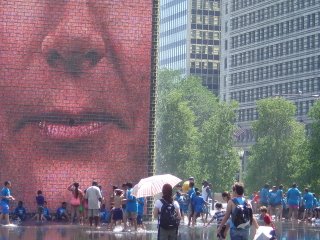 It remains hot as hell, but I head over to Millennium Park, because that's what I signed up for, I guess. My first stop is the fountain, which you've probably seen pictures of - more of a manmade waterfall really, and easily the most popular spot in the park this afternoon. Then I head to the cafe where they sell root beer floats, and take it to a shady spot where I can watch some street performers who are, it turns out, on the city payroll. I walk around some of the other spots, and finally come around to the Cloud Gate.
It remains hot as hell, but I head over to Millennium Park, because that's what I signed up for, I guess. My first stop is the fountain, which you've probably seen pictures of - more of a manmade waterfall really, and easily the most popular spot in the park this afternoon. Then I head to the cafe where they sell root beer floats, and take it to a shady spot where I can watch some street performers who are, it turns out, on the city payroll. I walk around some of the other spots, and finally come around to the Cloud Gate.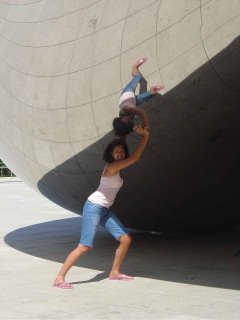 This I'm certain you've seen pictures of. I certainly have before now. But they have done nothing to communicate the experience of being here. I had thought from photographs that it was kind of a silly, fairly ugly, rather pointless bit of public sculpture. It's none of the above. It's wonderful, surprisingly sensuous, disorienting, and amusing. It invites all kinds of interactions with it and with the other people who are there.
This I'm certain you've seen pictures of. I certainly have before now. But they have done nothing to communicate the experience of being here. I had thought from photographs that it was kind of a silly, fairly ugly, rather pointless bit of public sculpture. It's none of the above. It's wonderful, surprisingly sensuous, disorienting, and amusing. It invites all kinds of interactions with it and with the other people who are there.It also lends itself to photographs, particularly self-portraits.
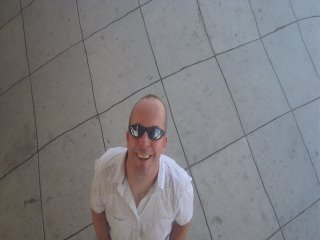
All in all, the park strikes me as pretty successful, although I'm sure it's a better success when it's not 101 degrees out. It was a major project, and although it apparently had heavy corporate backers, who have put their name all over the place, it somehow seems to have been sold as a valid public project in and of itself, and not as an accessory to a real estate deal.
I've noticed, around town, that the streets are well-paved and clean, there aren't mountains of trash bags everywhere, commerce seems lively. It's like they're trying to be the city that works or something.
Of course, maybe you only get these things when you have a mayor for life. And the papers are overflowing with details on the police torture scandal. And the schools doubtless remain dysfunctional. And my drive down 63rd Street suggested that paving and commerce have only gotten so far.
I take the train back north and look for coffee and wifi. And look. Finally, I admit defeat and go to a Caribou Coffee on Broadway, where I not only violate Rule #2 for the first time - sort of, all I have is iced decaf - but I have to pay for the internet access.
The heat is replaced by pouring rain, and either one of them would make biking miserable. So instead it's dinner at the Melrose Restaurant. The guy in the booth behind me has issues. He keeps asking the man across from him, who looks to be about 23, what he sees in him. "I'm forty years old," he keeps saying. The idea that he's nothing but a sugar daddy is torturing him. Either it's not true or the kid is too canny to say it is, but there's no happy ending here. Or, from all appearances, middle, or maybe beginning.
Karaoke at the refreshingly attitude-free North End, where, however, they have the slowest version of "Wild Wild Life" imaginable. It lasts about six interminable minutes. But the crowd is considerably friendlier than Roscoe's and almost all of them look like they've held a job before.